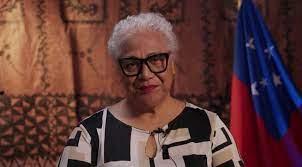
https://www.aosis.org/statement-by-the-chair-of-the-alliance-of-small-is...
It is my honour as Chair of the Alliance of small island states to address this August international conference for SIDS, and as Samoa, host of the last SIDS conference, to pass the baton to Antigua and Barbuda.
SIDS started this journey towards this International Conference (SIDS4) with high aspirations and ambitious ideas. Ideas, as articulated by Mishra in her writings, (and I quote) “are the seeds of innovation, the catalysis of change, and the driving forces behind progress. They have the remarkable capacity to inspire action, to challenge the status quo, and to push the boundaries of what is possible.”
Ideas have the power to change the world. Their impact can change the course of history.
And often, they have.
We arrived here, in the beautiful islands of Antigua and Barbuda determined to right our sails. As with Samoa before, and Mauritius and Barbados even earlier, SIDS have held fast to the belief that our destinies are as important as any other, that the idea of our development is not just a dream but one grounded in absolute possibility.
We hold on to the idea of our resilient nations even in midst of what can often seem like an impossibility. Any cursory look at the world we live in reveals a space of conflict, want and inequality.
Our future seems precariously perched.
Our destinies handed off to those who pillage and batter our world.
The seas rise, our debts balloon, our people struggle, and we are told to keep heart, to bear up. It’s a story that predates the First International Conference on SIDS.
But a better world is possible. It is our intrinsic belief that we can in fact right our sails and create a world where the idea of our resilient development is not farfetched.
Keynes said, “the difficulty lies not so much in developing new ideas but escaping from old ones”. The path to real change can seem almost hopeless, especially when the roadblocks and stumbling blocks in this intractable system seems so fixated on maintaining itself. Even when the socio-economic imperative to take action seems certain, we hesitate on political grounds. The decades long approach of the multilateral system was perhaps more acceptable years ago, but the same cannot be said today. We know well that the layered crises we are observing across the world leave little room and time to maneuver. We know that SIDS are facing unenviable decisions, between the recovery of today or the development of tomorrow.
Throughout this week I do not doubt that leaders from across the SIDS regions will petition for greater equity, for the international community to see us today as they did in 1994, as a group of countries whose vulnerability demands for them to be treated as a special case for sustainable development.
I do not doubt that our leaders will speak about a world where economic growth and well-being ought to be sustained and our economies are robust, diversified, adaptable and able to withstand shocks, ensuring social equity, and promoting environmental sustainability.
I also do not doubt that they will remind that the next ten years are critical for SIDS. They might note that a new context is emerging where the economic, social and environmental as well as geopolitical threats to SIDS development are so great that they can only be ameliorated by a reinvigorated enabling environment that gives meaningful effect to our sustainable development.
My call to you then is simple, in the midst of this busy week, remain focused – recollect what occasions a category of countries as a special case for development; reaffirm that action costs little but inaction can cost much; and recommit to grand ideas where countries, small or large, rich or poor are all deserving.
In 1994 we set off on a noble path. We agreed that small islands and low-lying coastal developing States deserved special treatment, in no small part because of who these countries are at their core. We formed partnerships and enabled action. But friends, it has not been enough. Often, we were too slow to act.
This week we are gathered in a unity of purpose. We are assembled to be bold, to create ideas with the power to change the world, and to confirm our commitment to SIDS through the simple idea espoused in the African proverb, alone we can go fast, but to go far we must go together.
Let us not leave these shores with anything less.
I wish to thank our wonderful hosts, the honorable Gaston Browne and the warm people of Antigua and Barbuda for that distinctive island hospitality. Prime Minister, you and your team have gone above and beyond to ensure a successful SIDS4 and a time well-remembered, and we are grateful.
I also wish to thank the co-chairs of the SIDS4 Preparatory Committee, the Permanent Representatives of Maldives and New Zealand to the United Nations, for leading us through what was not an easy, but wholly important process towards the completion of the outcome for this Conference. The Antigua and Barbuda Agenda for SIDS (ABAS) is our renewed declaration for our prosperity. It is our guiding principles for the next decade of action.
I wish us all well.
Thank you.









